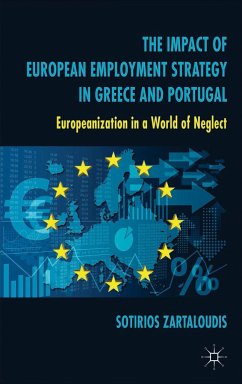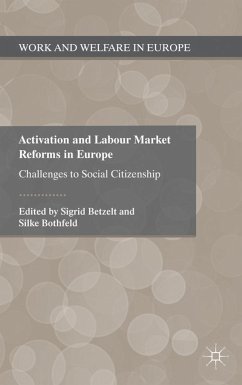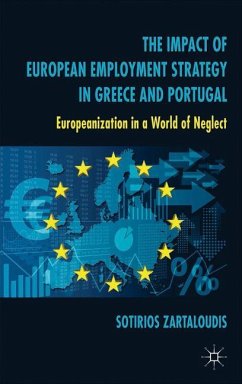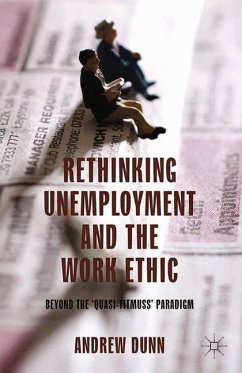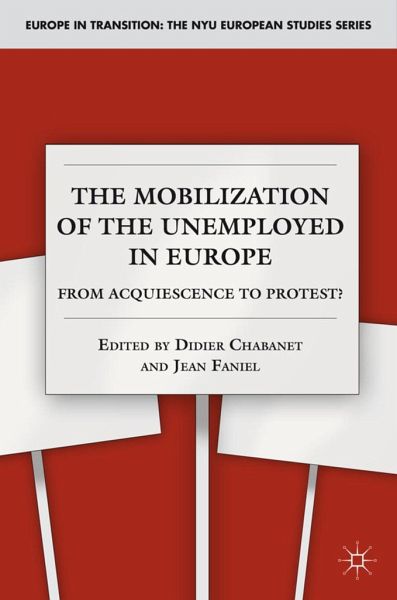
Gebundenes Buch
The Mobilization of the Unemployed in Europe
From Acquiescence to Protest?
Herausgegeben: Chabanet, Didier; Faniel, Jean
Versandkostenfrei!
Versandfertig in 6-10 Tagen

PAYBACK Punkte
19 °P sammeln!





In the face of high unemployment in Europe for the past thirty years, the unemployed have organized themselves and mobilized at levels ranging from the local to the transnational. This work explores why, when, and how the unemployed move from acquiescence to protest.
DIDIER CHABANET Marie Curie Fellow at the European University Institute in Florence, Italy, and Senior Research Fellow at the Triangle Research Centre of the École Normale Supérieure de Lyon, France. JEAN FANIEL Researcher at the Centre de Recherche et d'Information Socio-Politiques (CRISP) in Brussels, Belgium.
Produktdetails
- Europe in Transition: The NYU European Studies Series
- Verlag: Palgrave Macmillan / Palgrave Macmillan US / Springer Palgrave Macmillan
- Artikelnr. des Verlages: 978-0-230-61939-5
- 2012 edition
- Seitenzahl: 285
- Erscheinungstermin: 15. Dezember 2011
- Englisch
- Abmessung: 236mm x 157mm x 20mm
- Gewicht: 571g
- ISBN-13: 9780230619395
- ISBN-10: 0230619398
- Artikelnr.: 29928694
Herstellerkennzeichnung
Libri GmbH
Europaallee 1
36244 Bad Hersfeld
gpsr@libri.de
"This compilation of country-specific studies provides a wealth of information to help us make sense of the protest movements erupting across Europe. The book is timely indeed!" Frances Fox Piven, distinguished professor of political science and sociology, The Graduate Center, City University of New York
"This is an outstanding collection of essays on the relatively neglected topic of political mobilization around unemployment. It takes the standards of scholarship in this area to a new level of empirical detail and theoretical sophistication. Especially innovative and important is the comparative analysis of unemployed mobilizations across a range of diverse developed nations. The editors are to be congratulated on an excellent volume. The publication is timely during a period of renewed economic crisis that social scientists are only just beginning to analyze. Chabanet and Faniel's text will be a key reference in understanding the political consequences of economicrecession and unemployment for many years to come." Paul Bagguley, reader in Sociology, University of Leeds
"This is an outstanding collection of essays on the relatively neglected topic of political mobilization around unemployment. It takes the standards of scholarship in this area to a new level of empirical detail and theoretical sophistication. Especially innovative and important is the comparative analysis of unemployed mobilizations across a range of diverse developed nations. The editors are to be congratulated on an excellent volume. The publication is timely during a period of renewed economic crisis that social scientists are only just beginning to analyze. Chabanet and Faniel's text will be a key reference in understanding the political consequences of economicrecession and unemployment for many years to come." Paul Bagguley, reader in Sociology, University of Leeds
Für dieses Produkt wurde noch keine Bewertung abgegeben. Wir würden uns sehr freuen, wenn du die erste Bewertung schreibst!
Eine Bewertung schreiben
Eine Bewertung schreiben
Andere Kunden interessierten sich für


